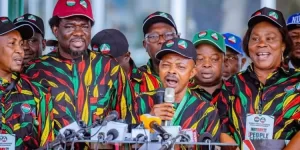The Nigeria Labour Congress (NLC) expressed deep concern on Thursday regarding the recent surge in petrol prices, stating that it has effectively nullified the yet-to-be-implemented N70,000 national minimum wage. This situation has left Nigerian workers in a dire predicament.
At the opening ceremony of a two-day workshop in Lagos, themed “Strategies for Effective Implementation of the 2024 National Minimum Wage Act” for the Southern Zone, NLC President Joe Ajaero voiced the labour movement’s dissatisfaction with the federal government’s management of the fuel subsidy removal and the subsequent price hikes.
Ajaero insisted that organized labour had been misled by President Bola Tinubu into accepting the N70,000 minimum wage as a means to preempt fuel price increases, a decision he now regrets.
“There is a tactic to distract our attention, to call us names, level allegations against us over cybercrime, financing terrorism, sponsoring terrorism, and the rest,” he stated. He further pointed out that while labour is dealing with these allegations, the government has allowed the issue of skyrocketing petrol prices to continue, exacerbating the hardship faced by Nigerians.
During the negotiations with President Tinubu prior to agreeing on the minimum wage, Ajaero disclosed they were promised that the government would not increase fuel prices.
He disclosed that in their negotiations with President Tinubu prior to agreeing on the N70,000 minimum wage, they were promised that the government would not increase fuel prices. However, Ajaero said they feel betrayed by the President, as the situation has deteriorated instead of improving.
“I repeat, we were betrayed by Mr President. That statement we issued over our being betrayed is being denied by officials of the government. I am repeating it that we were betrayed,” he asserted.
He recounted the meeting with the President, saying, “Some of you here were at the meeting when Mr President said, Ajaero you are the problem. Since we said subsidy is gone. You don’t want to allow us to increase again. If you allow me to increase we will pay you that N250, 000.” Ajaero explained that the President had given them a short timeframe to decide on the proposal between a N250,000 minimum wage and an increase in fuel prices.

READ ALSO: NLC Condemns FG, Demands Immediate Reversal Of Petrol Price Increase
“We said no sir, Mr President; we can’t be holding our meeting here in your office. Let us take one week break and come back and report back to you. He said okay, I am traveling but I will cancel my trip for one week. That was how we adjourned for one week,” he continued.
After consultations during that week, Ajaero stated, “We said to Mr President, no, we can’t allow you to increase to any length because that will affect all Nigerians and we will be seen to be selfish. Even the N250,000 will not be useful to us. If we continue to increase salary, it will make a mess of our economy and then you continue to increase pump price. In fact, that N250,000 may not be enough to even buy fuel.”
Ajaero also mentioned the President’s offer to fund a trip to other West African countries to study petrol pricing, highlighting that petrol prices there are significantly higher, yet they do not have refineries. “We responded by telling him to check the borders because that is why they are smuggling those products to those countries,” he remarked.
On the adjourned date of their discussions, Ajaero emphasized that their focus was not on negotiating fuel price increases. “So let’s concentrate on the minimum wage. Some of these things informed the acceptance of N70,000 minimum wage which some of us here were saying was not enough,” he noted.
He concluded by explaining the ongoing challenges labor faces: “This is the dilemma all of us are facing. In fact, the private sector employers in our meeting gave us a tough time. They refused to shift and they wanted to vote with state government, federal government and the private sector on one side, all against labour on the other side. These were some of the things that necessitated all those walkouts you saw.”

